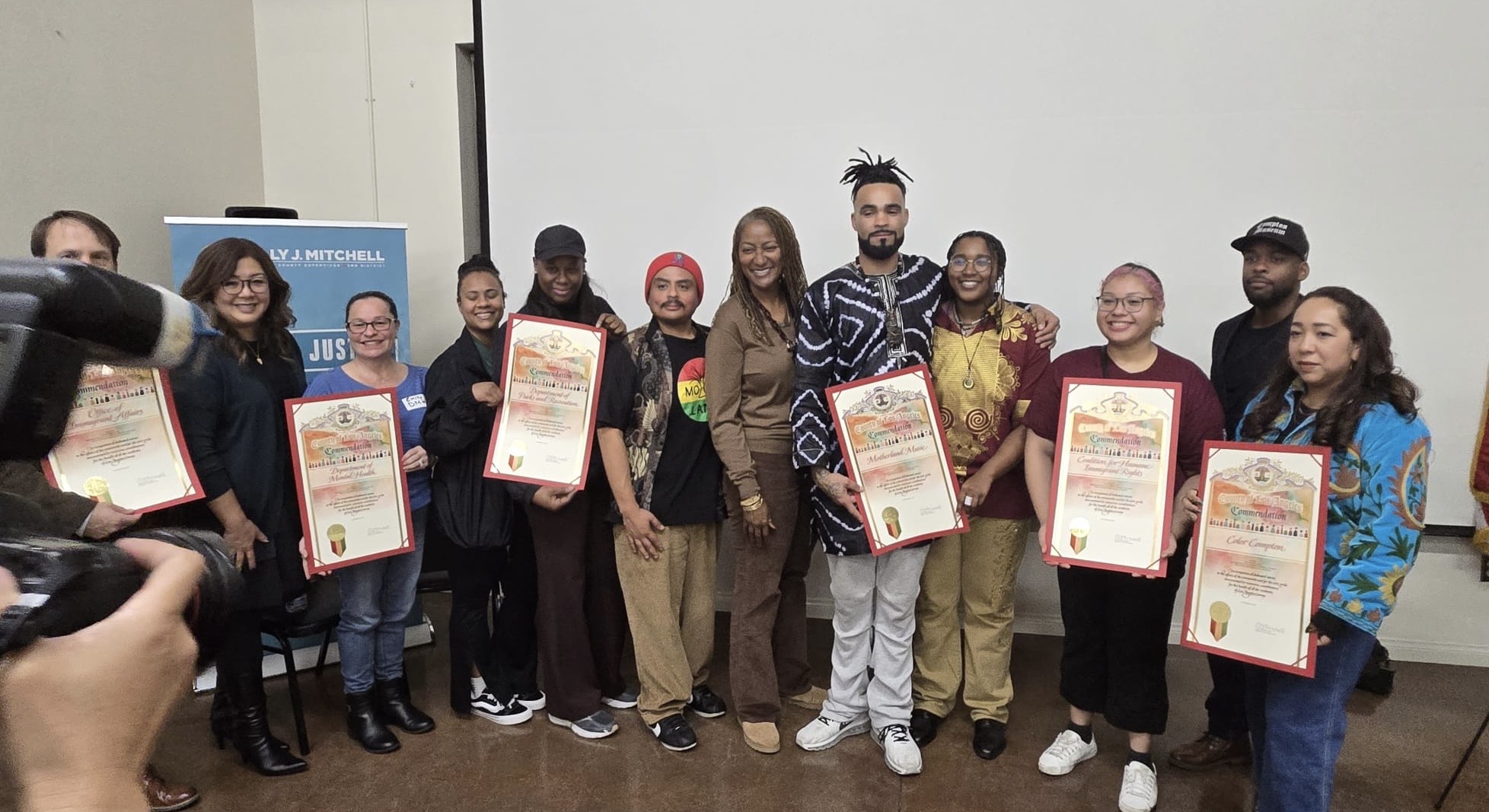An unfiltered night of immigrant stories, policy truths, and civic urgency in Los Angeles.
Magazine, The Immigrant Experience
The rain fell with purpose on the evening of November 20, as community members, artists, organizers, and public officials gathered at the Del Aire Park Community Center for RJLE’s Racial Justice Learning Exchange, “The Journey of Us: Honoring the Diverse Immigrant Stories that Shape Us.” Hosted by LA County Supervisor Holly J. Mitchell and her team, the event offered more than reflection—it became a space for truth-telling, civic reckoning, and a raw examination of the policies shaping immigrant life across Los Angeles County.
Mitchell represents the 2nd Supervisorial District of Los Angeles County—a region as diverse as the stories shared that evening. Home to more than two million people, including many immigrant families, the district spans 176.96 square miles from the South Bay to Koreatown. It includes portions of 12 cities, 22 unincorporated communities, and 56 neighborhoods within the city of Los Angeles. It was in this richly multicultural setting that The Journey of Us unfolded, offering both policy clarity and community healing.

Daniel Sharp
The evening opened with a detailed presentation of demographic and policy data delivered by Daniel Sharp, Chief of the Office of Immigrant Affairs for Los Angeles County. The data, sourced from the USC Equity Research Institute, outlined that of LA County’s 10.2 million residents, more than 3.5 million are immigrants. Roughly 950,000 are undocumented, comprising 9% of the total population. Contrary to national narratives suggesting recent influxes, nearly three-quarters of LA County’s undocumented residents have lived here for more than a decade. One in five has been here for over 30 years. This population includes nearly 800,000 undocumented Latino residents, representing about 40% of Latino immigrants. The undocumented share among Black immigrants is also significant—13%—surpassing that of any other group except Latinos.
The presentation emphasized the extensive integration of undocumented individuals into the local economy. About 40% of undocumented workers in LA are employed in construction, essential in post-wildfire rebuilding efforts and infrastructure development for upcoming events like the World Cup and the Olympics. Another 37% work in grounds maintenance and cleaning services. These workers are embedded in every sector that keeps the county functional.
Attention then shifted to a series of federal policy developments that have placed undocumented residents at increasing risk. These include the administration’s implementation of a non-citizen registration requirement—formally termed the Alien Registration Requirement—which mandates undocumented individuals 14 and older to register online and submit biometric data. Failure to comply could result in fines, jail time, and future immigration penalties. This directive, based on a WWII-era law, has overwhelmed legal service providers and left communities fearing whether to comply or remain in the shadows.
The data presentation also highlighted the administration’s reclassification of individuals with Temporary Protected Status (TPS) from countries such as Nicaragua, Honduras, and El Salvador, effectively rendering tens of thousands of people undocumented overnight. This includes individuals who had held protected status for decades. The government has also expanded its detention authority and now mandates incarceration for certain immigrants based on arrest—not conviction—effectively bypassing due process.
Consumer protection staff warned of an increase in fraudulent immigration service providers preying on vulnerable families. Only licensed attorneys and DOJ-accredited representatives are legally permitted to provide immigration advice, but notaries, tax preparers, and insurance agents continue to exploit fear and confusion. Immigration scams also proliferate via social media and messaging apps like WhatsApp.
To combat this, the county’s Department of Consumer and Business Affairs promoted its rapid response resources, including a legal advice hotline, Know Your Rights campaigns, and a rent relief program for families impacted by immigration enforcement.
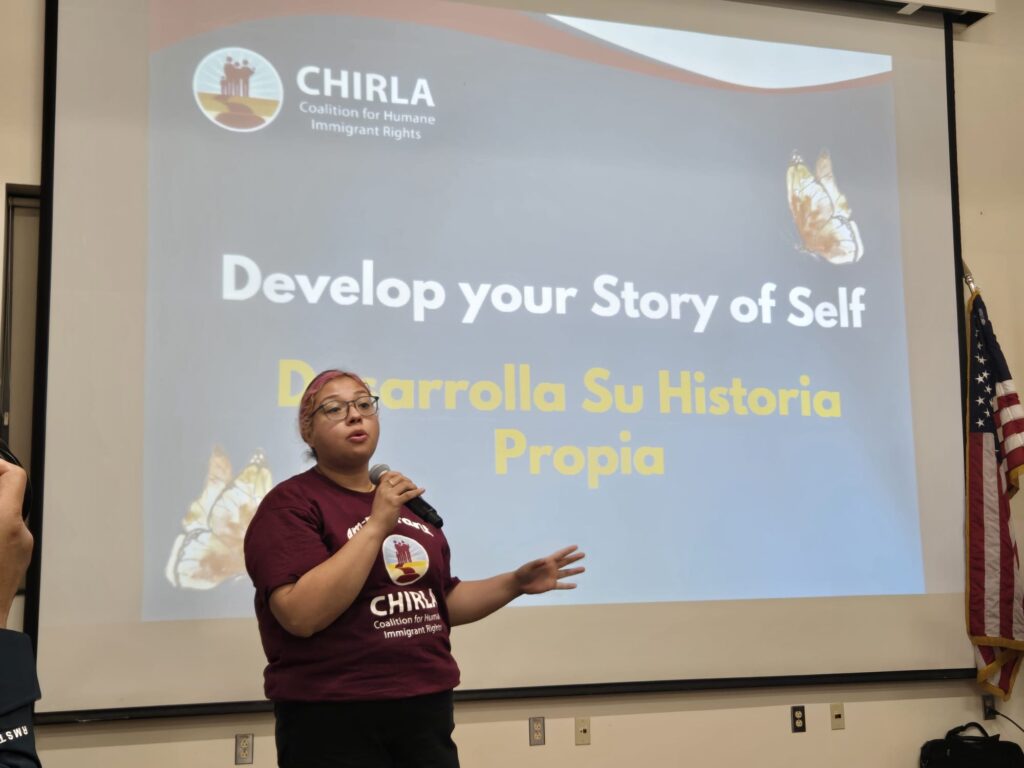
CHIRLA youth organizer Sylvia Tremillo
CHIRLA youth organizer Sylvia Tremillo then led a workshop on reclaiming the immigrant narrative. She addressed the criminalization of immigrants, drawing parallels to how Black communities were targeted during the War on Drugs. Tremillo critiqued how mainstream rhetoric equates immigration with criminality, and emphasized the importance of narrative as resistance.
Tremillo described the structure of public narrative: challenge, choice, and outcome. She told stories of immigrant parents choosing between bringing children on dangerous border crossings or leaving them behind indefinitely. She shared experiences from working with youth whose parents had lived in the U.S. for decades while they remained abroad, separated by borders, laws, and time.
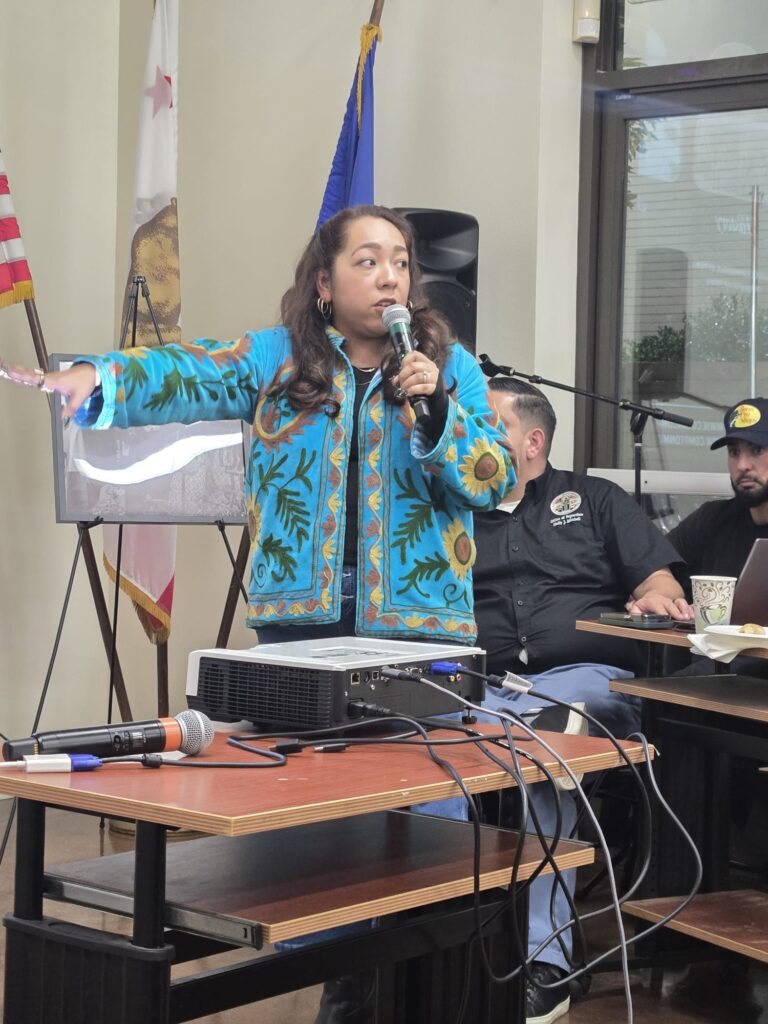
Abigail Byrd
A married couple, Abigail Lopez Byrd and Marquell Byrd, co-founders of Hello Compton and the Compton Art & History Museum, then took the floor. Abigail described how her parents immigrated illegally during the Reagan era and received amnesty. They subsequently helped bring extended family to the U.S., using their Compton home as a waystation. The Byrds’ family experience became the foundation for their community arts work, which they use to document and preserve immigrant histories.
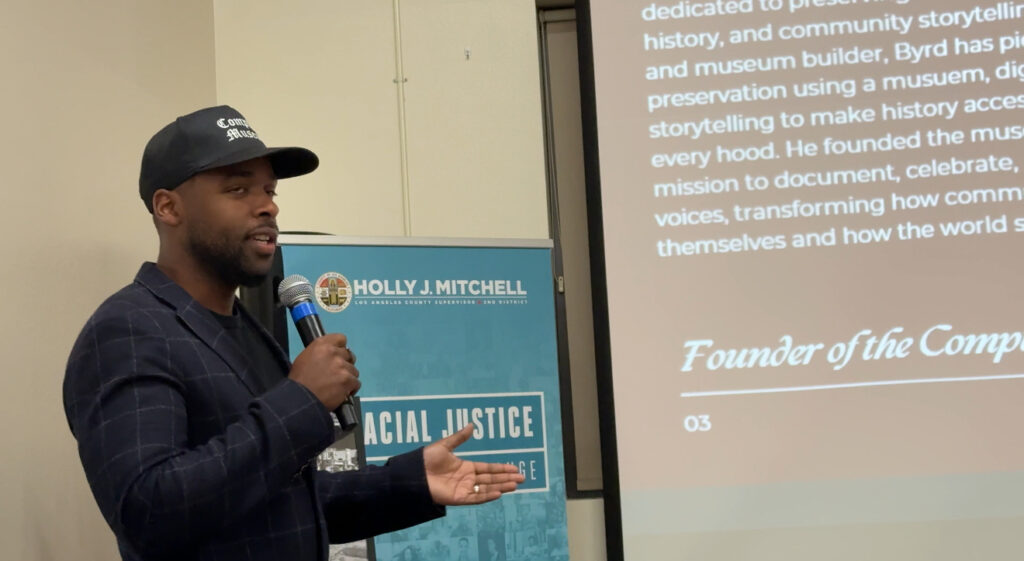
Marquell Byrd
Marquell shared how he documented a June 7 ICE raid in their neighborhood. He described seeing helicopters, riot gear, and neighbors uniting to protect each other. He was tear-gassed and struck with pellets while photographing the raid. One contributing artist to their museum’s exhibition, a PhD student and U.S. citizen, had been detained by ICE despite having documentation. He now suffers from trauma and brought children with him to the museum opening as a protective measure.
Their current exhibition, “Boundless: The Unending Sound of Resistance,” features images from those raids and installations confronting the everyday terror of immigration enforcement. One piece features a mirror with the word “Missing” above it and “Detained by ICE” below—a visceral reminder that anyone could be next.
Midway through the event, Pamela Anchang, founder of The Immigrant Magazine, offered her personal testimony. “Just recently, my team and I—our company is over 20 years old—have been telling immigrant stories. And most people don’t understand what it is to be an immigrant. People say, ‘Why are they illegal? Undocumented?’ No one ever pays attention to the backstory. Most legal immigrants could have easily ended up undocumented. I came here almost 30 years ago, legally, as a student. But if not for the chance of meeting someone who explained the immigration process to me, I would have fallen through the cracks. I came legally, but I could have easily ended up on the other side.”
She described the sacrifices families make just to send a child abroad. “Most of us come from countries that cannot afford the dreams and aspirations that we have. Sometimes those dreams are also challenged by political or socioeconomic crises. I didn’t choose to be born where I was born, but I made the choice to come to the United States. And when I arrived, my country was going through political instability. That’s how I ended up here.”
She closed with a promise: “I’m preparing to launch a podcast series called ‘The Immigrant.’ Exactly for the reason we are here today—to tell your story. And I hope we can be partners in this endeavor.”
Audience participation was a defining feature of the night. Several attendees stood to share personal reflections—some immigrants themselves, others allies who had come to listen and learn. One gentleman, visibly moved, expressed that the evening had reshaped his understanding of what immigrants endure. He admitted he had never considered the complexity behind someone being undocumented and pledged to do more to support immigrant communities moving forward. His testimony mirrored the room’s tone: reflective, changed, and committed.
While the evening carried the gravity of law, policy, and lived trauma, it was also punctuated with moments of healing and cultural elevation. A guided meditation session helped ground attendees amid the emotional weight of the evening. Later, West African drumming filled the room—rhythmic, ancestral, defiant. These sounds, rich with heritage, transformed the space into one of resilience. The drums reminded everyone that survival, too, is a form of resistance.
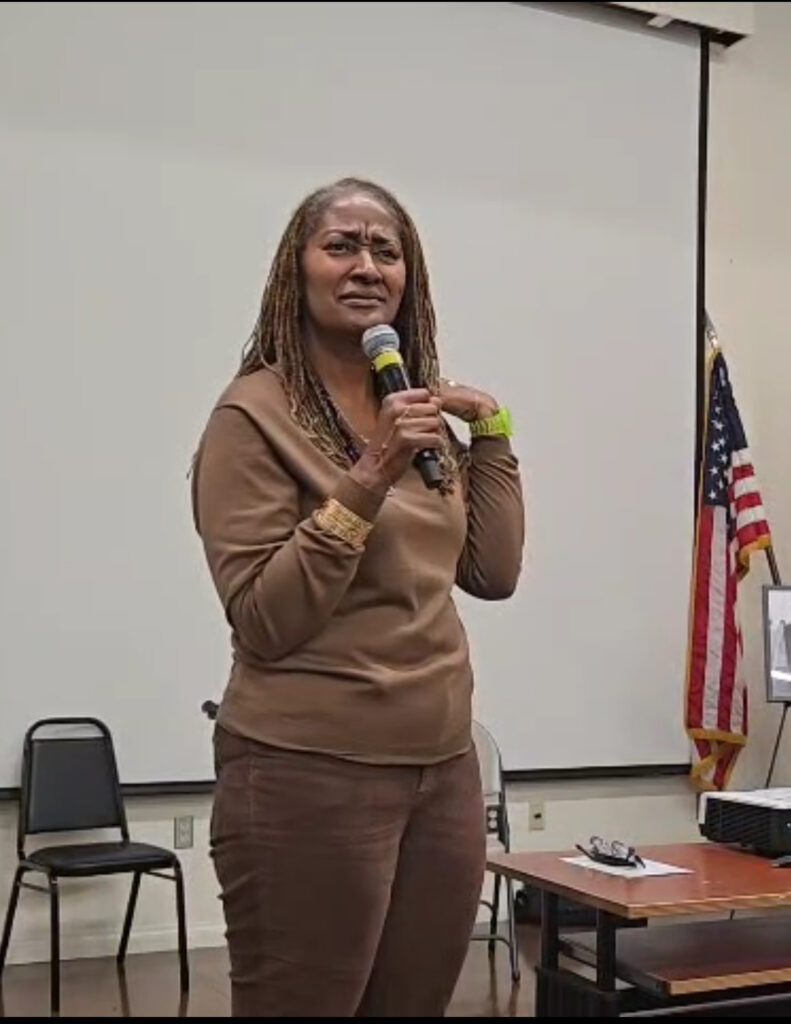
Supervisor Holly J. Mitchell
Supervisor Holly J. Mitchell closed the evening by connecting the dots between systemic oppression and personal history. “Unless you’re Indigenous, we’re all immigrants,” she said. She reflected on her own heritage as a descendant of people who survived the transatlantic slave trade, Jim Crow, and state violence. Mitchell urged the audience to share what they learned, use red “Know Your Rights” cards in their workplaces, and resist injustice in any form.
Certificates of recognition were awarded to all speakers. As the rain continued outside, those inside the Del Aire Park Community Center had reshaped the immigrant narrative—one not of victimhood, but of agency, resistance, and truth. The Immigrant Magazine bore witness to this exchange—not as a media entity, but as a cultural and civic participant.
This was not an event. It was a reckoning.
#LACounty2ndDistrict #ImmigrantVoices #TheJourneyOfUs #UndocumentedAndProud #HollyMitchell #RJLE #ImmigrantRights #CommunityPower #StorytellingAsResistance #ComptonArts

